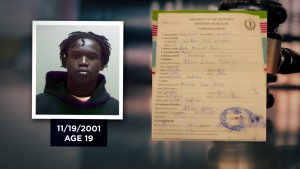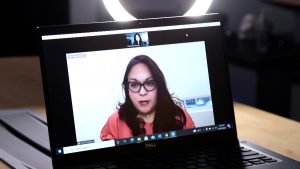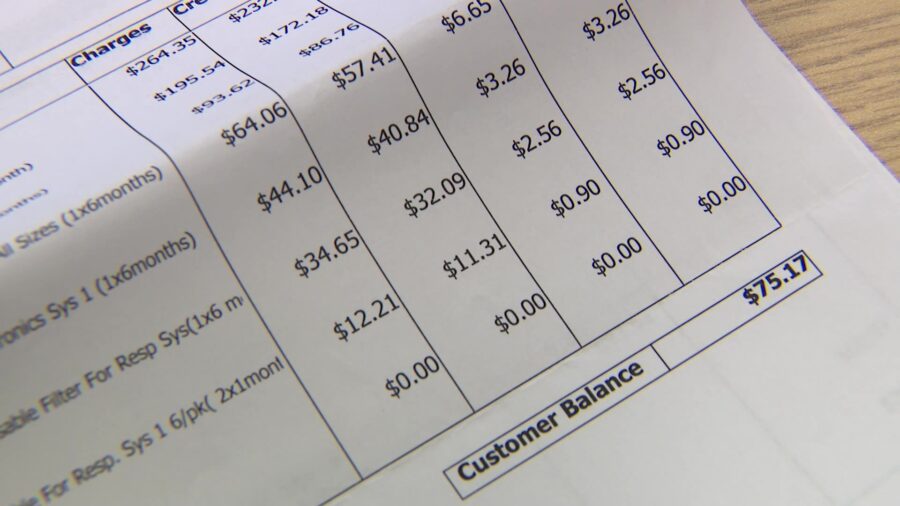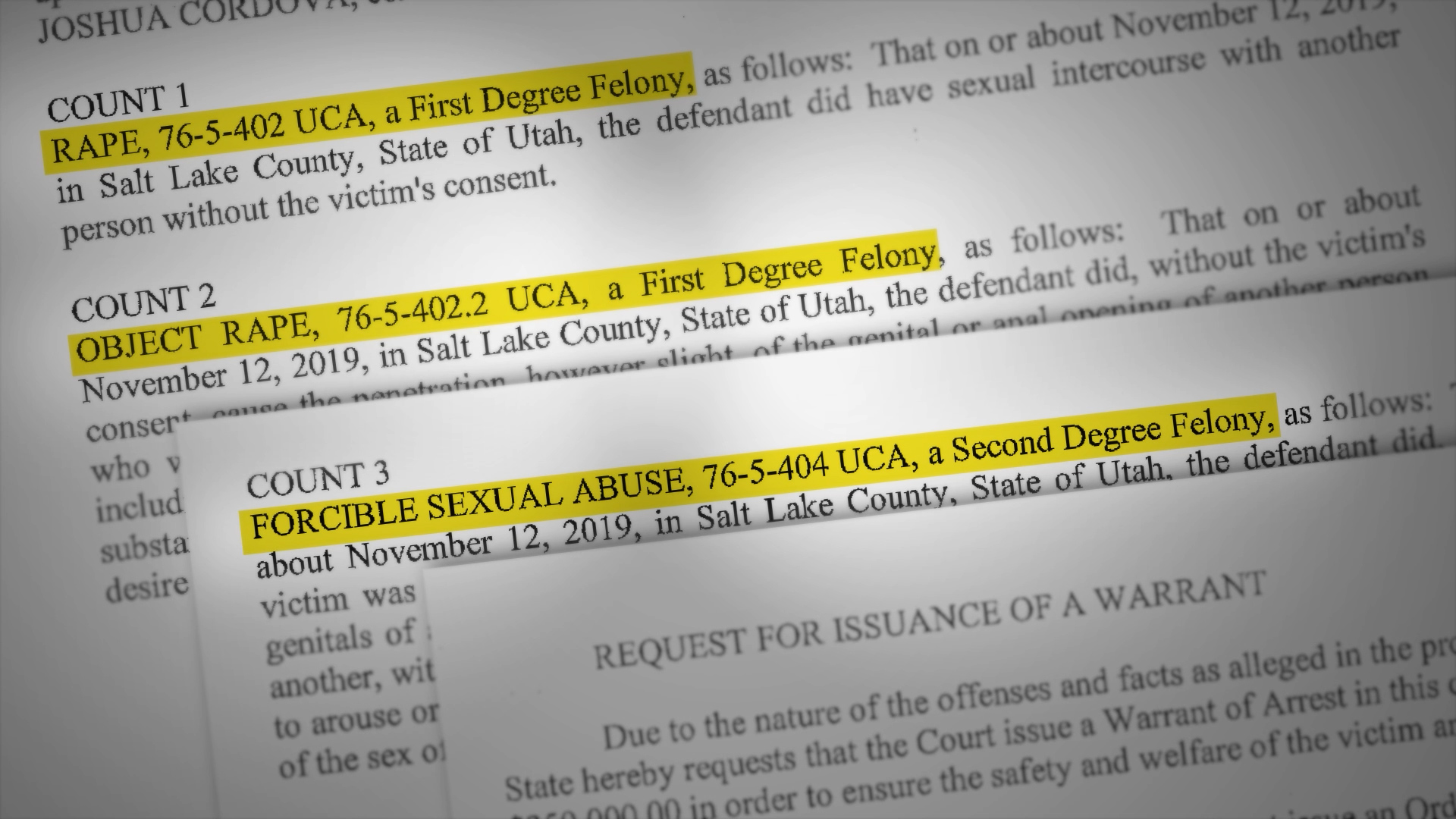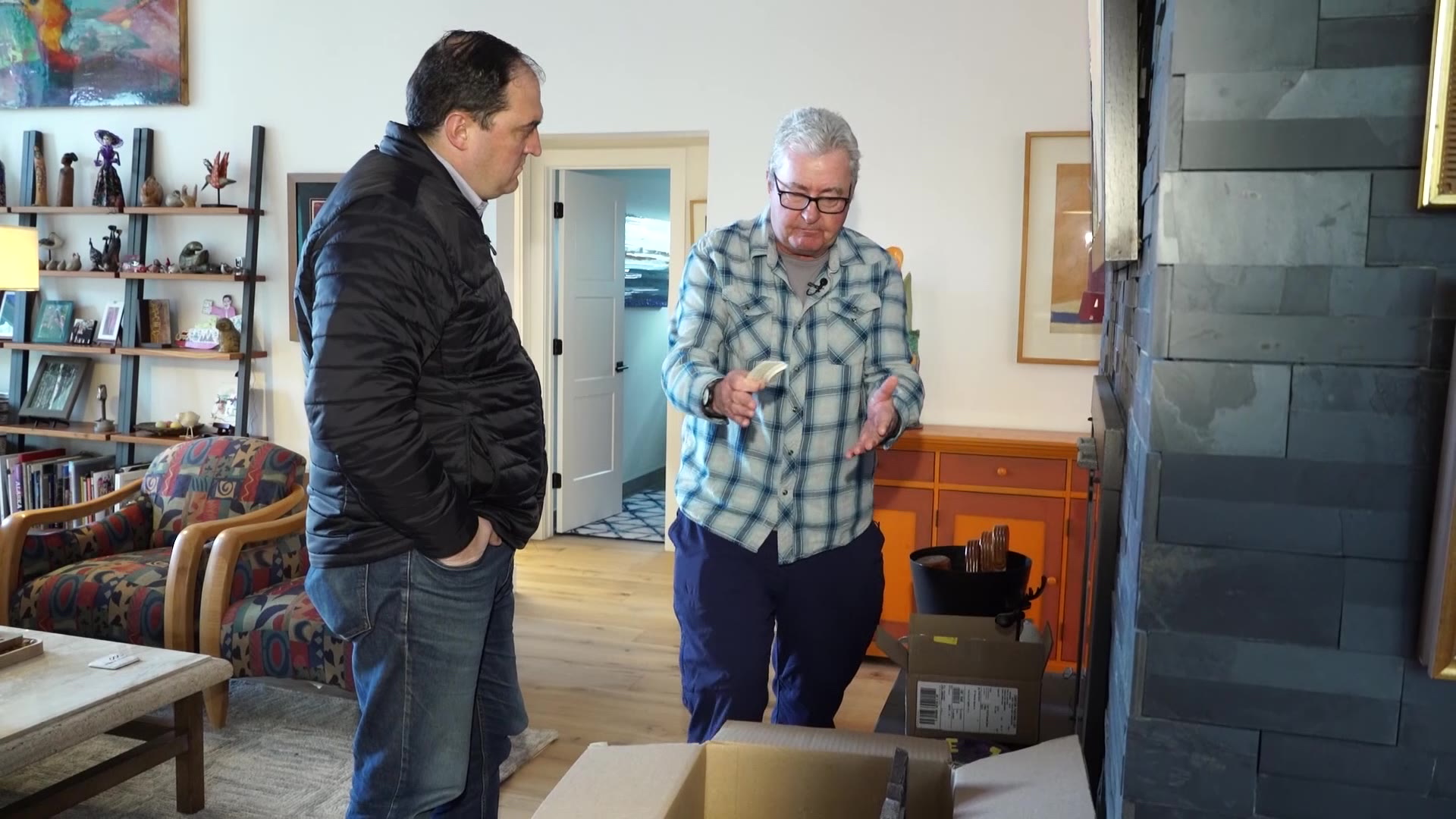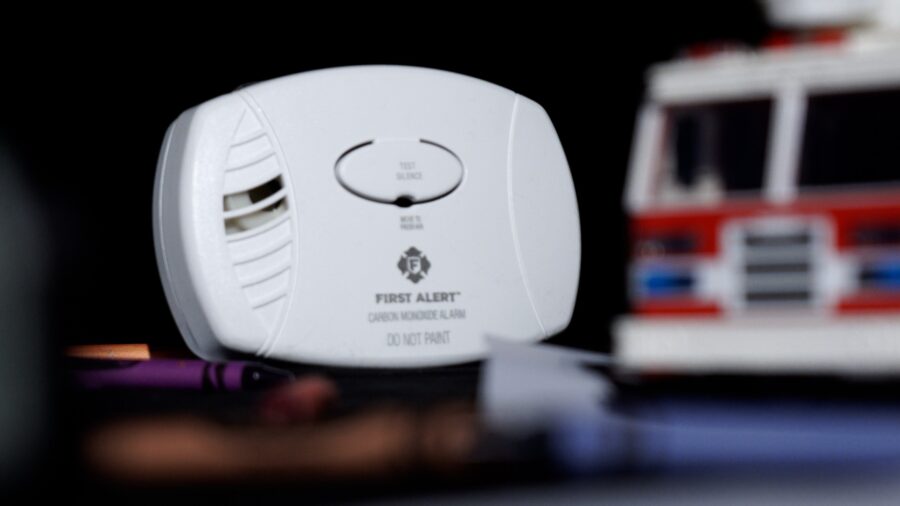Uncertainty about a defendant’s real age can have grave impacts on justice
Oct 15, 2021, 12:25 PM
SALT LAKE CITY – When an individual enters the criminal justice system, their date of birth is a critical piece of information that can significantly influence the outcome of a case.
In most cases in Utah, if a defendant is under the age of 18, they’ll end up in the juvenile justice system, while people 18 and older could face harsher consequences in adult court.
KSL investigators found multiple examples of confusion surrounding the date of birth in cases teetering between the two court systems — raising questions about whether Utah’s justice system can improve on its process of verifying identifying information.
How old is Buk M. Buk?
In the days after Buk M. Buk’s arrest in the fatal shooting that killed University of Utah football player Aaron Lowe, 21, and critically injured 20-year-old Fuamoli Pomale, the KSL investigative team began digging into Buk’s criminal history.
While there’s no question Buk has a troubling record of violence, there are questions about his true age and how uncertainty surrounding his date of birth might have impacted the outcomes of previous cases against him.
Adding to the confusion – Buk has misidentified himself to authorities multiple times.
According to the state, Buk was born on Jan. 1, 1999, making him 22 as of this story’s publication.
However, court documents and audio recordings show he’s disputed that date of birth multiple times during the last several years.
According to a motion filed by defense attorney Lance Talakai in 2019, Buk was born in Sudan and fled to Kenya to live with his stepmother after his mother died.
When they came to the U.S. as refugees in 2011, Buk, like many refugees, was assigned a birthdate, according to the motion.
The birthdate, Jan. 1, 1999, appears on all of Buk’s legal U.S. identifying documents. It’s the birthdate he’s used to go to school, apply for jobs and even take out a loan, according to a motion filed in the same case by prosecutors.
When Buk faced charges in adult court in 2017, officials believed him to be 18, according to his documentation. However, he told the court he was still a minor.
Before Aaron Lowe killing, suspect told a judge he’d avoid ‘the wrong people at the wrong time’
In an audio recording from a hearing in that case, Buk is heard telling the judge he was born in September of the year 2000.
Later, according to the motion written by Talakai, Buk’s stepmother was able to contact relatives who sent a photo of a Notification of Birth from the Republic of South Sudan Ministry of Health, with the date of birth recorded as Nov. 19, 2001.
The 2017 case was dismissed, with the docket stating, “defendant is a minor.” Later, a 2019 case was also dismissed. It’s unclear whether any of those charges were refiled in juvenile court.
Then, later in 2019, Buk again faced adult charges for crimes committed when he claims he was a minor.
“I am 17,” he told the judge during a hearing on Oct. 31, 2019. “… I proved it twice before.”
His defense attorney’s motion to dismiss the charges cited the previous dismissals, the photo of the Notification of Birth from Sudan and news articles explaining that refugees entering the country without verifiable birth dates are often assigned the first day of any given year.
Prosecutors argued strong evidence supported the 1999 birth date.
“The only evidence that he showed that he was a juvenile was a snapshot of some document,” prosecutor Roger Blaylock is heard stating in a court audio recording.
After multiple rescheduled evidentiary hearings, Buk’s attorney told the court on Jan. 22, 2020, that they were ready to move forward in adult court.
Court records indicate the judge had not yet made a determination on whether Buk was a minor at the time of the crimes.
“We have a deal in principle,” Talakai is heard telling the judge. “Me and Mr. Blaylock have to work out the details. What we would ask, judge, is we’re going to go ahead and… looking at it and the fact that he’s over 18 now, thinking that even if you were to rule for us that it would come back on a SYO, we’re gonna withdraw our motion.”
In Utah, the serious youth offender (SYO) process allows older juveniles to be transferred to adult court when facing specific, serious crimes.
Buk entered into a plea deal and was in and out of custody multiple times after starting probation in the case.
His most recent release before the September fatal shooting was in March 2021.
‘This is not something new’
Salt Lake County District Attorney Sim Gill said this is not the first time there has been a question about a defendant’s age.
“This is not something new that we’re experiencing,” he said.
He said in cases where there is a discrepancy in documentation, it can be difficult to confirm the truth.
“You want to make sure that we have, we can point to reliable information that we can rely upon, that the court can rely upon, and the legitimacy of that conviction, our system can rely upon,” said Gill. “So those are the kinds of things that we’re going to be looking for and that’s what we always try to find.”
The new Conviction Integrity Unit (CIU) in Gill’s office recently reviewed two cases in which defendants were prosecuted as adults for crimes that happened when they were minors.
The CIU concluded because the adult courts did not have jurisdiction over juvenile cases, the convictions lacked integrity. It recommended the convictions be vacated. Gill, who has committed to publishing the unedited CIU reports online for the sake of transparency, agreed.
“This is a serious issue, because it can have subsequent collateral consequences,” said Gill. “So, you want to get it right.”
The defendants in those cases were immigrants from the countries of Honduras and Mexico and were deported as a result of the convictions.
Serious consequences
“The consequences that these convictions triggered were very serious in their lives,” said Benji McMurray, an assistant federal public defender.
McMurray submitted the cases of Marlon Lambur-Navarro and Jose Luis Barrera-Landa to the CIU for review. He met the men when they were charged for re-entering the U.S. illegally, and discovered they were wrongfully prosecuted in adult court for crimes alleged to have occurred when they were juveniles.
“(The CIU) went to some real effort to verify the details and circumstances and, you know, 10 years after the fact they said, ‘Yeah, there was a mistake, and we need to vacate these convictions,’” McMurray said.
He praised the CIU for diligently reviewing the cases but said the impacts of the convictions on his clients’ lives are, in many ways, irreversible.
“It’s very difficult to unring the deportation bell,” he said.
Both men were caught after returning to the country illegally, McMurray said.
They hope with their convictions now vacated, they can one day return legally.
“Both of them are glad to clear that record,” said McMurray. “The most important thing for both of them is that they both have family in the United States. They’ve got U.S. citizen children who are here, and they would like to be with them.”
Marlon Lambur-Navarro
Lambur-Navarro was born in Honduras on Aug. 17, 1992, according to the CIU report, making him 17 years old and a juvenile in January 2010. According to his application to the CIU, he was caught selling $20 worth of drugs to an undercover officer.
He later pleaded guilty to a felony drug distribution charge.
The review of the case found June 17, 1999, was listed as his date of birth on the screening packet submitted to the DA’s office by a Salt Lake City Police Department detective, and that date of birth later appeared on official charging documents.
The review did not find any evidence that the error was intentional and the case file, while incomplete, did not include a record of any objection to the listed date of birth from Lambur-Navarro at the time.
According to the CIU report, Lambur-Navarro has since obtained a Honduran passport reflecting the 1992 date of birth.
“It must be assumed that since the passport is an official document the information it contains is accurate,” the CIU report states.
McMurray described Lambur-Navarro as a then-teenager who came to the U.S. dreaming of a better life.
“They get here, and it’s a different reality,” he said. “Imagine what it would be like, as a teenager, to be in a foreign country, where you don’t speak the language, you don’t have a support network, your family’s not with you, the only people who are with you are people who are living in the shadows.”
According to the report, Lambur-Navarro doesn’t deny he committed the crime, but he does claim the adult conviction led to his deportation, “which would not be the case if he had been treated as a juvenile in 2010.”
Darren Fafai, an immigration attorney with the nonprofit organization Immigrant Legal Services, said it’s difficult to know with certainty whether the conviction would have impacted Lambur-Navarro’s immigration status had it been handled in the juvenile system instead. He said each case is different, and whether an individual is deported is dependent on a multitude of factors.
Jose Luis Barrera-Landa
According to the CIU review of Barrera-Landa’s case, he was born in Mexico on Dec. 22, 1990, and was 19 years old when he was accused of having sex with a minor and charged in adult court.
The incident, however, was alleged to have occurred years prior, when Barrera-Landa would have only been 17, and a minor.
“He had actually just had his first child,” McMurray said. “He was engaged to be married to a U.S. citizen and he was really excited to build a life here in the United States.”
According to the CIU report, Barrera-Landa claims “though he persistently denied having sex with the alleged victim, he was promised by the officer who arrested him for the offense that if he admitted his guilt he would not be ‘charged with a crime because he was just a juvenile.’”
Two juvenile notices were filed for the case in 2010, but “the docket is silent on whether there was any official follow-up on the juvenile notices.”
In February 2011, Barrera-Landa pleaded guilty to a misdemeanor sexual battery charge. He was released to ICE for deportation the following May.
In his application to the CIU, Barrera-Landa claims he is innocent.
The panel did not take a position on the merits of the accusation against him but concluded the court “made a fundamental mistake of law when it assumed jurisdiction in Mr. Barrera-Landa’s case rather than referring it to the juvenile court” as required by state law.
Though the court record indicates Barrera-Landa was warned to not re-enter the country illegally, McMurray said he didn’t understand the sentence.
“He believed at the time that the judge that sentenced him said he had three years of probation,” McMurray explained. “And again, because of these cross-cultural communication challenges, he actually thought that meant that he had to stay away from the United States for three years, but then he could come back. He didn’t understand the law. So, he dutifully waited in Mexico for three years, came back to the United States looking for his fiancée and his child, and was horribly disappointed to discover that she had found a new spouse and had moved on.”
McMurray said Barrera-Landa stayed and tried to make a life for himself. He worked, he found a new partner and had children, but he was eventually forced to leave again due to his illegal re-entry.
“My understanding is that it will take them quite a while before they could come back here lawfully,” said McMurray.
Jurisdiction
The CIU review found the adult courts did not have jurisdiction over the cases involving juvenile defendants.
“Jurisdiction is a fancy word that means power,” McMurray said. “… the adult courts do not have power to make decisions that affect the life of a minor unless — and there is an unless here — it is the case that the law allows youthful offenders to be certified as adults. But there’s a procedure that has to happen.”
The CIU decision on the cases McMurray submitted raises questions about whether the adult court had jurisdiction to sentence Buk for crimes he committed while he might have been a juvenile.
McMurray said he couldn’t be sure without thoroughly reviewing the case himself, but he does wonder how things might have been different had Buk been diverted to the juvenile system, rather than the adult system.
The adult system, he said, is often focused on punishment, while the juvenile system places greater emphasis on opportunities for treatment, intervention, and rehabilitation.
Because the justice system often looks to events of the past to inform decisions in the present, McMurray said it’s imperative that the record is accurate.
“In our justice system, one of the most important virtues is accuracy, and getting things right,” he said.
Difficult, but not impossible
A memo from the Utah Department of Corrections Division of Adult Probation and Parole to the court in one of Buk’s previous cases flagged the age discrepancy, noting the previous dismissal of charges due to concerns about Buk’s true age and the photo of the birth certificate from Sudan, stating, “This agency has no way to verify the authenticity of this document.”
Division director Dan Blanchard said his department typically relies on the court in such scenarios.
“The case has already been up to that point, a proceeding in court,” he explained. “… We’re also trusting that some of those issues would be resolved along that process.”
He said when preparing a pre-sentence or supervision report, his division might ask the defendant to provide documentation or reach out to ICE to try to resolve a discrepancy but would not go as far as contacting a foreign government for confirmation of an individual’s information.
“There may be six or seven weeks that we have to complete the background if we’re doing a pre-sentence investigation,” he said. “So, we have a short timeframe, along with other duties that the investigator is covering, you know, multiple cases, so we typically would not go that in-depth.”
Ultimately, Blanchard said any unresolved discrepancies would be presented to the court.
“I think a lot of people think that the courtroom is a truth finding mechanism, as though we’re a crystal ball,” McMurray said. “The reality is that the judge only knows what we as attorneys present to the court.”
McMurray attributes the issue to limitations within the justice system. He said he’s always seen it as his duty, as a defense attorney, to get the most reliable documents he can.
“It can be very hard when it comes to getting documentation, birth certificates, passports from foreign countries, but it’s not impossible,” he said.
Due process for all
“I think there’s a lot at stake,” said Sen. Luz Escamilla, D-Salt Lake City.
She said after looking into the issue, she does not believe there is any provision in Utah law that specifically addresses protections for immigrants and refugees who might find themselves in adult court as juveniles due to poor documentation.
“I think it’s an issue of, how do you make sure that the authenticity of documents (is) in place? What if there’s no documents?” she said.
It’s difficult to quantify the problem. Escamilla doesn’t think concerns about reliable and truthful documentation are a factor in cases frequently but does believe the issue occurs and that lawmakers should seek potential solutions.
“The fact that one or two or 10 individuals or 100 individuals have been impacted, I think it’s, you know, as lawmakers and as policymakers, we should look into this,” she said.
Escamilla said she plans to reach out to other states with refugee programs to find out if there are best practices for verifying the personal identification information of individuals who find themselves in the criminal justice system without adequate or accurate documentation.
“We want to make sure everyone gets a fair process,” she said. “I think that’s what gets us to be who we are as a country.”
Have you experienced something you think just isn’t right? The KSL Investigators want to help. Submit your tip at investigates@ksl.com or 385-707-6153 so we can get working for you.

